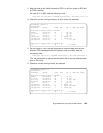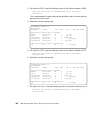186 IBM 9077 SP Switch Router: Get Connected to the SP Switch
Configuration assumptions:
• The SP Switch Router FDDI media card has been installed according to
Section 4.4, “FDDI Configuration” on page 121, and works properly.
• The SP Switch Router Adapter card has been installed according to
Section 3.7, “Step-by-Step Media Card Configuration” on page 86, and
works properly.
• The SP Switch Router Adapter card and SP processor node Switch
adapters are in the same IP subnet.
• ARP should be enabled on the SP Switch network to provide the most
flexibility in assigning IP Addresses (strongly recommended!).
• If ARP is disabled on the SP Switch network, the IP addresses assigned to
the nodes must be determined by the switch node numbers.
Note:
The SP Switch Router Adapter card will not properly forward IP data to
nodes assigned with an IP address that is in another subnet.
• The ADSM server is installed on node1 in SP21; ADSM clients are
installed on Nodes 9-12 in SP2.
Configuration:
The configuration of this scenario is exactly as described in Section 5.1.4.2,
“SP Switch - FDDI Connection with Bridging” on page 179. Just one
additional step has to be carried out, as follows:
1. Open /usr/lpp/adsm/bin/dsm.sys.
2. Change the parameter
TCPServeraddress to the IP address of the Switch
interface of node 1:
TCPServeraddress 192.168.14.1
Performance:
To get a rough overview of the data transfer rates that can be achieved during
an ADSM backup session in our configuration, we started an incremental
backup of a filesystem that contained a 300 MB file on nodes 9-12 in SP2.
We measured a transfer rate of up to 7 MB/s one ADSM client to the ADSM
server. Starting another backup session on the other three nodes did not
influence the transfer rate of the other nodes. Every node was able to transfer
up to 7 MB/s independent of other nodes backup activity, summing up to 28
MB/s on the server side. This does not approach the maximum bandwidth of
the SP Switch Router. Limiting factor in this scenario is the ability of the
ADSM server to handle such data transfer rates (processor performance) and
to write all data fast enough to storage media.


















